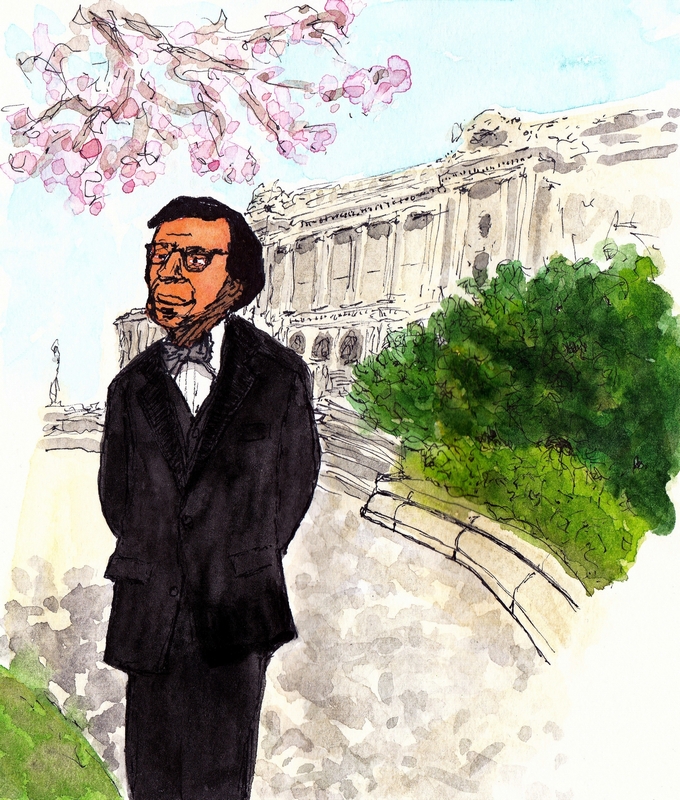Robert Hayden served as U.S. Poet Laureate from 1976 to 1978. He was the first person of African descent to serve, but his selection was notable in other ways as well: he was the first Laureate with a major disability (he was legally blind), and he was also a member of a religious minority (Baha’i).
“Hayden wrote, ‘since I came to the Library in the glare and blare of publicity that few of my predecessors, I imagine, have experienced…As the first Afro-American to become Consultant…I was a news item (however minor) in the United States, Europe, and Africa, I suddenly became “public”…I began to feel more and more alarmed as the notoriety swirled around me. I did not want any of this, for it had little to do with me as an artist and far too much to do with me as an ethnic minority. I felt trapped in sociology and politics. I am, of course, enough of a realist to know that, given the racial dilemmas in our country, the situation could hardly have been otherwise. Cold comfort indeed…I am glad to remember how emphatically I insisted that it was my intention to do what I could for all American poets without regard to ethnic backgrounds.’”
—from Poetry’s Catbird Seat: The Consultantship in Poetry in the English Language at the Library of Congress, 1937-1987, by William McGuire, Library of Congress, 1988

“Hayden in Springtime” by Dan Vera, watercolor, 2017.
Three Excerpts from “How it Strikes a Contemporary: Reflections on Poetry and the Role of the Poet”
Poetry is the art of saying what cannot be said. Or at least not said quite so effectively in any other form. Maybe I’ve worn this statement out, I’ve used it so many times, and I should give it a long rest. But somehow I can’t resist repeating it. What I have said in my poems I am sure I could not otherwise have said. Indeed, I might have, characteristically, said too much. A poem is built on silences as well as on songs.
…there are thousands tonight who except for us would have no one to speak in a human voice for them. Who more earnestly than poets have warned of the dangers to the human spirit of abstraction and anonymity?
Let there be poets and more poets. Just so long as they are poets. For poets too, as I have said, are the keepers of a nation’s conscience, the partisans of freedom and justice. Even when they eschew political involvement, by the very act of continuing to function as poets, they are affirming what is human and eternal. As I have contemplated the almost bewildering diversity of American poetry, I’ve come to see a vital relationship between the poetic endeavor and freedom of speech in this country. In the monolithic dictatorship, poets are silenced unless they repeat the clichés acceptable to the State. The dangers of censorship in our own country are certainly present. And although I would not overstate the case by saying it is poets who are chiefly keeping the lines of verbal communication open, I will say that we know the dangers of censorship and we are therefore part of the advance guard in the struggle. When poets are silenced, then tyranny has won.
Recorded on May 8, 1978 at the Coolidge Auditorium at the Library of Congress in Washington, DC for the Archive of Recorded Poetry and Literature. Sponsored by the Gertrude Clarke Whittall Poetry and Literature Fund, Library of Congress.
Robert Hayden (August 4, 1913 - February 25, 1980) served as Consultant in Poetry to the Library of Congress from 1976 to 1978. He won the Grand Prize for Poetry at the first World Festival of Negro Arts in Dakar, Senegal (1966), was elected a Fellow to the Academy of American Poets, and the U.S. Postal Service created a Hayden stamp in 2012, part of a series of ten great twentieth century American poets. He is the author of nine collections of poetry, and a collection of essays.